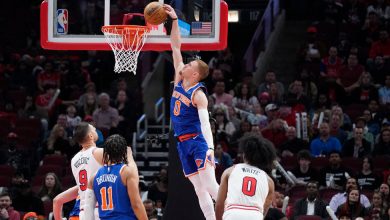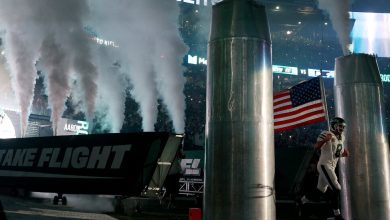Amir Johnson Is More Than an Answer in N.B.A. Trivia

Amir Johnson felt warm, either from the temperature in the room or the gravity of the moment. He removed his shirt.
Johnson stayed nervous throughout N.B.A. draft night in 2005 as hour after hour, pick by pick, slipped past. Instead of planning for prom or making a final decision on his college destination, Johnson, at 18, was studying the television screen at his aunt’s house as his professional future hung in the balance.
The N.B.A. draft cut to a commercial as it neared its end. A ticker of draftees’ names continuously sprinted across the bottom of the TV screen. Then someone screamed.
The Detroit Pistons had just selected Johnson, out of Westchester High School in Los Angeles, with the fifth-to-last pick, 56th overall.
The room, full of Johnson’s relatives and friends, detonated. “We had horns and everything,” Johnson recalled. He tried to stand up, but found his back glued to the plastic smothering his aunt’s couch.
Johnson’s journey had started, his dream formulating in fast forward. So what if the Pistons had just defeated his hometown Lakers in the championship? Larry Brown, Detroit’s coach, was on the phone, welcoming Johnson to Detroit. Only a few months earlier, Johnson had committed to play for the University of Louisville, yearning to experience college life outside Southern California.
Then, Johnson convened with his peers at the McDonald’s All-American Game, an exclusive exhibition for the nation’s best high school players. One by one, the top players confided in the others that they planned to skip college for the N.B.A., following in the trailblazing steps of Kevin Garnett, Kobe Bryant, LeBron James and Dwight Howard.
The N.B.A. closed its doors to high school players after Johnson, who was the final high school player drafted before a new collective bargaining agreement rule went into effect requiring that draft-eligible players be at least 19 years old and at least one year removed from high school.
“I hope that’s on ‘Jeopardy!’ one day,” Johnson, now 34, said with a smile.
The sun is setting on the careers of the prep-to-pro players who both revolutionized and modernized the N.B.A. James, 37, remains the focal point for the Lakers, where he is joined by Howard, who comes off the bench. Atlanta’s Lou Williams is the only other active N.B.A. player who joined the league from high school before the rule changed.
“If you’re ready and you got the opportunity to go pro, why not?” Johnson said.
When one door closes, another opens — or a few do.
Today’s top high school basketball players are presented with a variety of destinations for a gap year on their way to N.B.A. riches and fame. They can opt for the traditional route of college in hopes of a status-boosting N.C.A.A. tournament run. They can play professionally overseas, as LaMelo Ball did before the Charlotte Hornets drafted him in 2020.
Or, in a recent change, they can join domestic professional leagues like the Atlanta-based Overtime Elite or a specialized team like the Ignite, an incubating team for high school phenoms in the N.B.A.’s developmental G League that is paying some top players as much as $1 million over two seasons. The Ignite also have a handful of veteran players like Johnson, a good complement — in basketball and life experience — for the burgeoning stars fresh out of high school.
“The N.B.A. is a privilege,” said Jason Hart, the Ignite’s coach, who played four seasons at Syracuse before bouncing around the N.B.A. “It’s not a right. We want them to cherish every day while you’re here on this journey, because this definitely won’t last forever.”
The Ignite, in their second season, are rounded out by seasoned players like Johnson, Pooh Jeter and C.J. Miles, who was drafted into the N.B.A. out of high school with Johnson in 2005.
The Ignite offer the talented teenagers an introduction to the N.B.A.’s circadian rhythm without everything on the line, as could be the case when Johnson joined the league.
“This G League team is actually helping getting these guys ready to go play pro first, which we didn’t have,” Johnson said. “We just got thrown into the fire, and they get to learn and then go, which is dope. They can have that N.B.A. schedule where you got to wake up, and travel, and go to shootaround.”
When Johnson joined the N.B.A., players could find themselves at the mercy of a franchise’s commitment to development, or its lack thereof.
The Chicago Bulls, for example, acquired the big men Tyson Chandler and Eddy Curry out of high school in 2001, hoping they would lead the franchise out of its post-Michael Jordan hangover. The Bulls offered playing time, but little development or direction in acquiring life skills.
In Detroit, Johnson found the opposite. He joined a championship-level team of 30-year-olds with families and of established post players like Rasheed Wallace, Ben Wallace and Antonio McDyess.
The Pistons, Johnson said, helped him learn life skills by helping him in apartment hunting, teaching him how to manage a bank account and helping him get his driver’s license.
He received few minutes on the court but was willing and ready to listen and work, the individual effort folding into the momentum of an entire team. It was a quality that Johnson had cultivated as a youth when he participated in track and field, his original sports love.
Johnson took some online classes at the University of Michigan but mostly regarded his time in Detroit as his college experience. He volunteered to leave the N.B.A. for stints in the G League, then known as the N.B.A. Development League, or D League. With the lower-level teams in Grand Rapids, Mich., and Sioux Falls, S.D., he came to know Texas Roadhouse and biscuits and could rely on constant playing time.
A strong work ethic contributed to Johnson’s productive 14-year N.B.A. career in Detroit, Toronto, Boston and Philadelphia as a reliable and steadying influence.
Johnson joined the Ignite last season with flickering aspirations of prolonging his playing career.
Younger players, Johnson found, sought him out with questions. He surprised himself with how easily he had the answers at his disposal, like how to handle family obligations, how to establish routines and how to dress.
“And if you do wrong, you’re going to be like, ‘I didn’t brush my teeth counterclockwise’ or something like that,” Johnson said. “A routine that gets your mind focused on the task is very helpful — knowing what you have to do in the morning to get your momentum going.”
Johnson was elated on draft night in August when N.B.A. teams selected Ignite players like Jalen Green and Jonathan Kuminga.
Johnson always figured he could be a player development coach if he wanted to. He now finds himself pulled to the strategy behind the game, envisioning a second career in coaching.
“That passion when I was young and hungry to keep learning, it’s kind of leaning toward the coaching part,” he said.
Johnson easily spots himself in the eyes of players like Scoot Henderson, who opted for the Ignite over two more years of high school.
Whenever Henderson makes a mistake on the court, he rushes over to talk about it with Johnson so that it won’t happen again.
“It just feels like a mirror,” Henderson said. “He knows what we are going through right now. He knows our thought process on everything.”
Most players are used to working hard. That part is easy for anyone who is serious about the game. The leap is more of a mental leap than anything else, and Johnson is the positive voice in the ears of the Ignite players, beckoning them to continue.
Entry into the N.B.A. is no longer a straight line for its younger players.
Johnson has come full circle to make that transition as easy as possible for others.
“They’re actually in tune with what I have to say,” Johnson said. “That changed my mind-set on wanting to give back. And when I saw those guys got drafted last year, it felt like I won a championship.”



